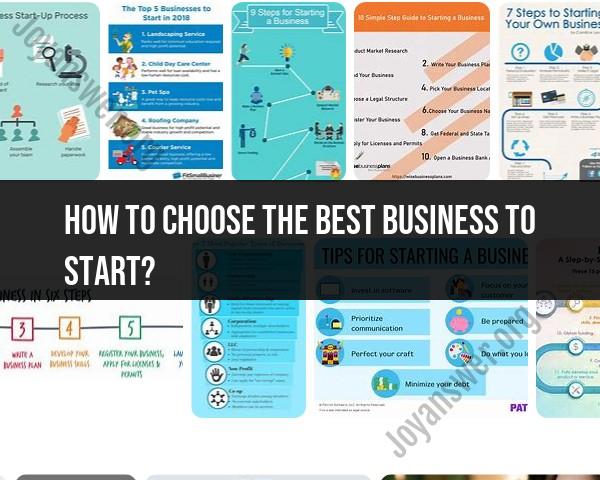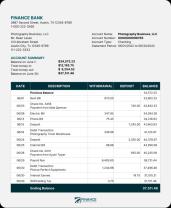How to choose the best business to start?
Choosing the best business to start involves careful consideration of various factors to align with your interests, skills, market demand, and potential for success. Here's a step-by-step guide to help you decide on the perfect business venture:
Self-Assessment: Begin by assessing your interests, passions, skills, and strengths. Consider what activities you enjoy, what you're good at, and what you're passionate about. Reflect on your previous work experience, hobbies, and areas of expertise.
Market Research: Conduct thorough market research to identify potential business opportunities and assess market demand. Look for gaps or underserved niches in the market where your skills and interests align. Analyze industry trends, competitor landscape, target audience demographics, and consumer preferences.
Identify Your Niche: Narrow down your options and focus on a specific niche or target market that you can serve effectively. Consider factors such as your unique value proposition, target audience needs, competition, and growth potential within the chosen niche.
Evaluate Viability: Assess the feasibility and viability of your business idea. Consider factors such as startup costs, potential revenue streams, profit margins, scalability, and regulatory requirements. Conduct a SWOT analysis (Strengths, Weaknesses, Opportunities, Threats) to evaluate the strengths and weaknesses of your business idea and identify potential challenges and opportunities.
Business Planning: Develop a comprehensive business plan outlining your goals, objectives, target market, value proposition, marketing strategy, operations plan, financial projections, and growth strategy. A well-defined business plan will serve as a roadmap to guide your business activities and attract potential investors or partners.
Validate Your Idea: Test your business idea by seeking feedback from potential customers, industry experts, mentors, and advisors. Conduct surveys, focus groups, or pilot tests to gauge interest and gather insights into customer preferences and needs. Use feedback to refine your business concept and make necessary adjustments.
Consider Resources and Support: Assess the resources, skills, and support networks available to you. Determine whether you have the necessary expertise, capital, and infrastructure to launch and operate the business successfully. Explore potential partnerships, collaborations, or mentorship opportunities to leverage additional resources and expertise.
Legal and Regulatory Considerations: Research and comply with legal and regulatory requirements relevant to your business, including business registration, licenses, permits, taxes, and intellectual property protection. Consult legal and financial professionals to ensure compliance and mitigate legal risks.
Financial Planning: Create a realistic financial plan outlining your startup costs, operating expenses, revenue projections, and funding sources. Determine how you will finance your business, whether through personal savings, loans, investments, or crowdfunding. Develop a budget and financial projections to track your expenses and monitor your business's financial performance.
Take Action: Once you've thoroughly evaluated your options and developed a solid plan, take decisive action to launch your business. Execute your plan methodically, monitor progress, and be prepared to adapt and iterate as you navigate the challenges and opportunities of entrepreneurship.
By following these steps and conducting thorough research and planning, you can increase your chances of choosing the best business to start and setting yourself up for success in the competitive marketplace.
Choosing the Right Path: Evaluating Business Opportunities
Starting a successful business requires careful consideration and evaluation of various factors. Here's a breakdown of key elements to consider:
1. Criteria for Evaluating Business Opportunities:
- Market Need and Opportunity: Identify a genuine need or problem in the market that your business can address. Is there a demand for your product or service? How large is the target market?
- Competition: Analyze your competitors and their strengths and weaknesses. What makes your offering unique and valuable compared to existing options?
- Financial Feasibility: Conduct a thorough financial analysis, including projected costs, revenue streams, and break-even point. Is the business financially viable in the long term?
- Management Expertise: Assess the skills and experience of yourself and your team. Do you have the necessary expertise to manage the business effectively?
- Legal and Regulatory Considerations: Research and understand any legal requirements and regulations related to your chosen industry and ensure compliance.
- Personal Passion and Interest: Consider your personal interests and skills. Are you passionate about the field and motivated to commit the time and effort required?
2. Market Analysis and Feasibility Studies:
- Market Analysis: This involves researching the target market, including demographics, needs, preferences, and buying behavior. Understanding your audience helps tailor your product or service to their specific needs and identify potential marketing strategies.
- Feasibility Studies: These studies assess the viability of your business idea from various perspectives, including financial, technical, and operational feasibility. They help identify potential risks and challenges and develop strategies to mitigate them.
By combining market analysis and feasibility studies, you gain valuable insights and reduce the risk of failure.
3. Personal Strengths and Interests:
While market opportunity and financial feasibility are crucial, your personal strengths and interests also play a significant role.
- Skills and Expertise: Leverage your existing skills and knowledge to fill gaps in the business or identify areas where you can excel.
- Passion and Motivation: Starting and running a business requires dedication and hard work. Choosing a venture that aligns with your interests will fuel your motivation and help you overcome challenges.
Finding the right balance between market opportunity, personal strengths, and passion is crucial for choosing a business venture that is both personally fulfilling and potentially successful.












